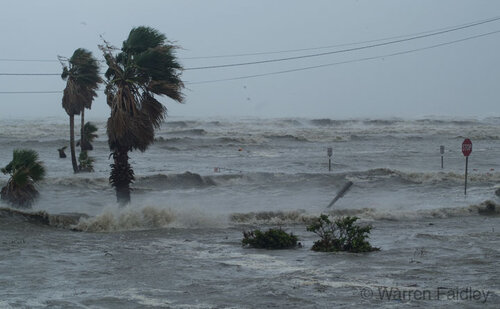Clearly, there is an appeal here that I am missing. Is it a running-with-the-bulls type of adrenaline rush? Is it different from a tornado chase in the rush that it brings? I would like to understand, because I do not like not understanding things. And I do not understand traveling from halfway across the country to spend two days in a room without power, eating only protein bars. These are the types of situations I try to avoid.
First let me say that I have never actually chased a hurricane, other than going down to the beach in Long Island or New Jersey for hurricanes that came close; some of these did make landfall but I was just heading to beaches close to where I lived at the time, not specifically targeting the eye.
But it’s on my bucket list and I absolutely see the appeal. In fact, when a hurricane is threatening land, and when I see hurricane footage, I get the same gnawing desire to be there as I get seeing a supercell on radar or watching tornado chase videos. Hurricanes were actually my first weather interest growing up on Long Island, well before I ever even thought about chasing a tornado.
The pure exhilaration of feeling the power of the wind has got to be an incredibly intense experience. The sensation of all hell breaking loose. We’ve all gotten a taste of that in storm chasing. The idea is not to be “in” the supercell, but most if not all of us have of course been close enough to feel its effects. The exhilaration of standing in strong inflow, transecting an RFD, being inside the bear’s cage, or even just allowing a squall line or derecho to run over you (while having appropriate shelter of course). Just experiencing severe thunderstorms at home and watching the rain blow sideways is a rush. Same thing even with blizzards and nor’easters here in the northeast where I live. I imagine in a hurricane this would be at least double the intensity. And storm surge particularly fascinates me. I look at before and after pictures of a coastline, where you can tell how far the water came up because of the damage or sand deposited in the streets, and it simply boggles my mind to imagine how the ocean could have come up that far. It is impossible for me to imagine or visualize that the water’s edge in the calm before and after photos somehow moved as far inland as the damage proves it did. I would just love to see that somehow, but it may be next to impossible to do so safely.
Remember, most people think we’re all nuts for chasing supercells and tornados too! They will never understand why we do what we do. Although we can explain *what* we like about storm chasing, it’s impossible to explain *why* we are wired this way. The same can be said about the myriad of niche passions out there. So don’t worry about not understanding it, you probably shouldn’t even try! But I am surprised how many chasers do NOT seem to have an interest in hurricane chasing, or actually seem to disparage it. There are obviously related and overlapping experiences in both storm chasing and hurricane chasing. I always assumed most of us love storms of ALL types.
Now, whether it is worth the time and trouble or not is a different question... There are reasons I haven’t actually chased a hurricane yet. I am not in a situation with work and family where I can drop everything with a couple days’ notice and run off somewhere for who-knows-how-long; at least with storm chasing I can take a two-week trip in late May and be reasonably certain of seeing something interesting. I am also perplexed by the logistics - being allowed to stay in a hotel or parking garage in an evacuation zone. Last thing I want is to travel somewhere, scout out locations and come up with nothing. Even if I could somehow make plans ahead of time, what happens when the eye wobbles just before landfall and you have to find a new location, again in an evacuation zone, maybe with a curfew in place. And as you said, who wants to stay in a room without power eating snacks for a day or more afterwards? Attempting any of this on an island is even more insurmountable to me, and then you add the inability to get home, the risk of crime and looting, etc. It’s one thing to go to a lot of trouble before the event, but once you have already experienced it I would imagine the positives of the experience quickly fade from memory while enduring the aggravation afterwards.

